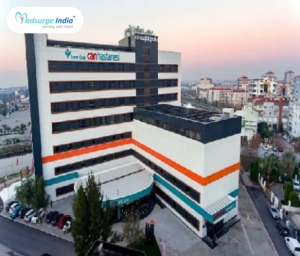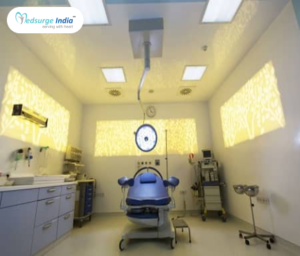Systemic Lupus Erythematosus Cost in Turkey
Unlock Exclusive Discount : Your Gateway to Premium Healthcare with Medsurge India Health Value Card.

Unlock Exclusive Discount : Your Gateway to Premium Healthcare with Medsurge India Health Value Card.


Systemic Lupus Erythematosus cost in Turkey can vary significantly, ranging from 3000 USD to 5000 USD or more, depending on the severity, complications, and treatment approach.
Several key factors can influence the cost of treating Systemic Lupus Erythematosus (SLE) in Turkey:
| Test | Prices |
| Antinuclear Antibody (ANA) Test | $25 |
| Anti-dsDNA Antibody Test | $30 |
| Anti-Smith (Sm) Antibody Test | $45 |
| Complete Blood Count (CBC) | $10 |
| Erythrocyte Sedimentation Rate (ESR) | $8 |
| C-reactive protein (CRP) | $10 |
| Urinalysis | $15 |
| Complement Levels (C3 and C4) | $25 to $50 |
| Kidney Function Tests | $10 |
| Liver Function Tests | $10 |
| Chest X-ray | $10 |
| Electrocardiogram (ECG) | $12 |
| Skin or Kidney Biopsy (if needed) | $35 |
| Lupus Anticoagulant Test | $45 |
| Antiphospholipid Antibodies Test | $80 |
| Cities | Prices |
| Istanbul | $3000 to $5000 |
| Antalya | $3000 to $5000 |
| Izmir | $3000 to $5000 |
| Ankara | $3000 to $5000 |
Systemic Lupus Erythematosus (SLE) is the most common type of lupus, classified as an autoimmune disorder with no known cure. Symptoms often include fatigue, joint pain, and skin rashes, particularly affecting the nostrils and cheeks. While there is no definitive cure, effective treatment options are available, allowing individuals to lead a normal life with proper management. Autoimmune diseases arise when the immune system mistakenly targets the body’s own tissues, viewing them as foreign invaders. These diseases can be classified as either common or rare, with systemic lupus erythematosus being one of the many types.
Various immunological disorders that exhibit similar clinical symptoms and laboratory results are often grouped under the term lupus, but SLE remains the most widespread. This chronic condition can present with severe symptoms at times, while at other times, symptoms may be relatively mild. With appropriate treatment, SLE typically does not significantly hinder a patient’s daily activities or overall quality of life.
The precise cause of Systemic Lupus Erythematosus is not completely understood. The immune system becomes dysfunctional, producing antibodies that attack healthy tissues instead of defending against infections and diseases. In autoimmune diseases, the immune system erroneously perceives the body as a threat, leading to this harmful response.
Causes of Systemic Lupus Erythematosus (SLE) include:
– Environmental Factors
– Genetic Factors
– Hormonal Factors
The term “lupus” has been associated with various immunological diseases that exhibit clinical and serological characteristics similar to SLE; however, SLE is the most prevalent form of lupus. This chronic condition is marked by periods of flare-ups, where symptoms can intensify at certain times. Thanks to modern treatments, many individuals with SLE can lead a normal lifestyle.
Symptoms of SLE can differ and may evolve over time. Common symptoms include:
– extreme fatigue
– joint pain
– joint swelling
– headaches
– a rash on the cheeks and nose
– hair loss
– anemia
– issues with blood clotting
– fingers that turn white or blue and experience tingling in cold conditions.
Additional symptoms may arise depending on the specific organs affected by the disease, such as the skin, heart, or digestive system.
Diagnosing SLE can be difficult, as its symptoms may overlap with those of other conditions. If you experience any of these symptoms, consult your physician. Your doctor can conduct tests to gather the necessary information for an accurate diagnosis.
Diagnosing the disease can be quite difficult due to its numerous cycles of flare-ups and remissions, along with symptoms that are often nonspecific and may overlap with those of other conditions. It is essential to communicate all symptoms to your healthcare provider, even if they are no longer present. Your doctor may need to perform additional tests to rule out other potential causes of lupus. This complexity is why no single test can definitively diagnose lupus. Physicians typically rely on the following methods for diagnosis:
Medical professionals manage this condition by focusing on its symptoms, as there is currently no cure. The primary objectives of treatment include:
While treatment options have significantly improved, physicians now have a broader range of strategies to help control the disease. Based on the evolution of symptoms and the side effects associated with treatments, your doctor may recommend a combination of therapies. The treatment options for this condition may encompass:
Some individuals may explore complementary and alternative therapies to ease their symptoms. However, research has not definitively established their effectiveness in preventing or treating lupus. Examples of such therapies include:
Herbs, vitamins, and non-prescription drugs may interact with other medications, so it is essential to consult your doctor before beginning any new treatment. Regular visits to your physician are vital for monitoring your health and any possible side effects from prescribed medications, no matter what treatment you are undergoing. Always seek your doctor’s advice before discontinuing any medications or therapies.
Also Read:- Lupus Treatment Cost in India
Systemic Lupus Erythematosus (SLE) is a complex autoimmune condition that requires thorough and accurate diagnosis to ensure timely and effective treatment. In Turkey, patients benefit from access to advanced diagnostic facilities and experienced rheumatologists at a more affordable cost compared to many Western countries. Early diagnosis through the right tests is key to managing the disease and improving quality of life.
| Estimate Type | Estimated Cost (USD) |
|---|---|
| Total Package Estimate | USD 25 – USD 50* |
*Final cost depends on hospital, patient condition, and additional procedures/devices if required. Share your reports to get an accurate quote.
Estimated cost range in India: USD 25 – USD 50*
*For an accurate quote and hospital options, share your reports and preferred city/hospital.
A: In patients with SLE, the leading causes of mortality are cancer and cardiovascular diseases. Despite advancements in treatment, SLE continues to be a significant cause of death, and infections are no longer the primary concern for these patients.
A: Kidney damage: Systemic lupus erythematosus (SLE), the most common form of lupus, can severely affect kidney function and shorten life expectancy. Your doctor may identify this condition as lupus nephritis. Heart damage: Lupus can lead to inflammation in the arteries, heart muscle, and other related tissues.
A: With early detection, careful management, and regular monitoring, approximately 85–90% of individuals with lupus can expect to live a normal lifespan.
A: For skin manifestations, the first-line treatments include topical agents such as calcineurin inhibitors and glucocorticoids, along with antimalarials like hydroxychloroquine. Systemic glucocorticoids may also be introduced, with the initial dose determined by the severity of the skin condition.

Rheumatologist
Consultant
15+ Years
Medicana Bursa Hospital, Ankara
View Doctor


Rheumatologist
Consultant
23+ Years
Medicana Bursa Hospital, Ankara
View Doctor
Rheumatologist
Rheumatologist
15+ Years of Experience
Biruni University Hospital
View Doctor
Rheumatologist
Consultant
14 years of experience
Medicana International Istanbul
View Doctor
Rheumatologist
Professor
30 years of experience
Okan University Hospital, Tuzla
View Doctor









By using our site, you agree to our Terms and Conditions, Privacy Policy and Refund Policy. Medsurge India provides reliable healthcare information and treatment options to support informed decision-making. Our content is designed to support and complement the guidance of your treating doctor, helping you feel informed and confident throughout your healthcare journey. We also Accept International Payments.

Copyright © 2025 NSM ONLINE SOLUTIONS PRIVATE LIMITED. All rights reserved.